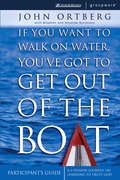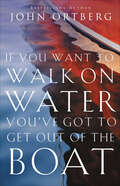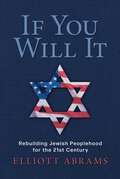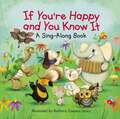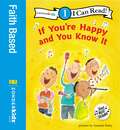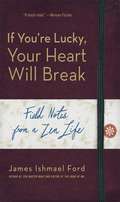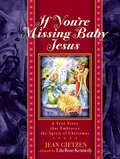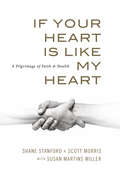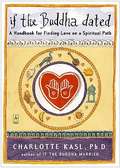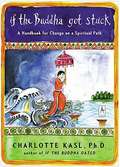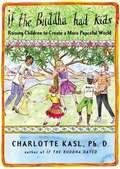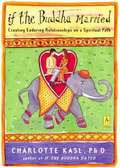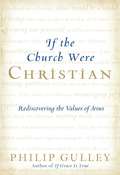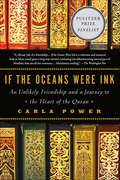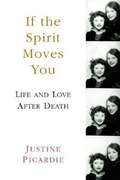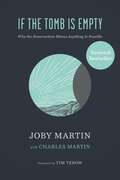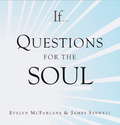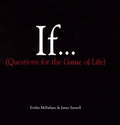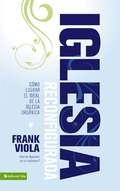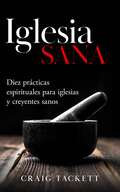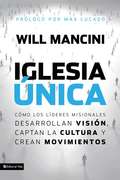- Table View
- List View
If You Want to Walk on Water, You've Got to Get Out of the Boat Participant's Guide: A 6-Session Journey on Learning to Trust God
by John Ortberg stephen SorensonIn this six-session study pastor and author John Ortberg teaches people how to trust God more fully. Using testimonial interviews to illustrate his talks, Ortberg teaches participants the skills essential for “water-walking” in faith with God. Designed for use with the video.
If You Want to Walk on Water, You've Got to Get Out of the Boat: A 6-session Journey On Learning To Trust God (Zondervangroupware Small Group Edition Ser.)
by John OrtbergYou're one step away from the adventure of your life. John Ortberg invites you to consider the incredible potential that awaits you outside your comfort zone.Deep within you lies the same faith and longing that sent Peter walking across the wind-swept Sea of Galilee toward Jesus. In what ways is the Lord telling you, as he did Peter, "Come"?Out on the risky waters of faith, Jesus is waiting to meet you in ways that will change you forever, deepening your character and your trust in God. The experience is terrifying. It's thrilling beyond belief. It's everything you'd expect of someone worthy to be called Lord.The choice is yours to know him as only a water-walker can, aligning yourself with God's purpose for your life in the process. There's just one requirement: If You Want to Walk on Water, You've Got to Get Out of the Boat.In this Christianity Today Award-winning read, bestselling author John Ortberg pushes you to take the last step that separates you from the adventure of your life. And, as a result, you will learn to:Recognize God's presenceDiscern between faith and foolishnessNot only expect problems, but field them when they comeReorient your thoughts about failure and see it as an opportunity to growWait on the LordAnd, ultimately, connect more deeply with GodFeatures discussion questions at the end of each chapter to enhance your reflection and spiritual growth. Also perfect for small group discussion.
If You Will It: Rebuilding Jewish Peoplehood for the 21st Century
by Elliott AbramsHundreds of thousands of young Jews have drifted away from the American Jewish community and many more may follow. This book explains to Jewish parents, donors, and organizations how Jewish education, Jewish summer camping, and time spent in Israel can revive and strengthen Jewish identity.American Jewish identity is steadily weakening. National surveys show hundreds of thousands of children with one, or even two, Jewish parents not being raised as Jews by religion or to think of themselves as members of the Jewish community. And the surveys show that young American Jews are far less engaged with and supportive of Israel than their parents&’ and grandparents&’ generations—even after the Hamas attacks on October 7, 2023 and the Gaza war that followed.What can Jewish parents and organizations do to ensure that future generations of American Jews will have a strong Jewish identity? Elliott Abrams looks at the history of the American Jewish community and its relationship with Israel—from the high points of Israel&’s creation in 1948 and the Six-Day War in 1967, to the years before the Second World War and now in the 21st century when many American Jews turned away from the Jewish State. He tells American Jewish parents, donors, and organizations where to focus: on getting children a serious Jewish education, sending them to Jewish summer camps, and bringing them to Israel for weeks, semesters, or academic years. These are the building blocks for Jewish identity that work reliably for young American Jews—especially those who are not Orthodox in their faith.Abrams, author of Faith or Fear: How Jews Can Survive in a Christian America, brings together the latest survey data, his own experiences at the highest levels of the US government, his knowledge of Israel, and his role as chairman of Tikvah, the Jewish educational non-profit organization, to provide the answers to the toughest questions American Jews—especially American Jewish parents—are facing.
If You Would See Good Days: Help for Daily Decisions
by Lottie Beth HobbsEveryone longs for the good days, so our task is to learn how this need and challenge can be met. "For he that would love life, and see good days..." (1 Peter 3:10)--a wonderful and gratifying possibility! Our Creator understands our aspiration and tells us how to achieve the good life. If You Would See Good Days deals with these divinely-given principles-- each chapter a separate and distinct topic. Practical, concise, down-to-earth, and easy to read. LOTTIE BETH HOBBS is a leader among women in many fields. As an author, speaker, and editor, she is honored in international journals in the U.S. and Europe. Her books circle the globe in many languages and continue to be solid and dependable aids in a changing and struggling world that calls out for help. Millions of her popular pamphlets, on a wide variety of subjects, have been distributed internationally.
If You're Happy and You Know It: Level 1 (A Sing-Along Book)
by ZondervanIf you're happy and you know it, clap your hands. (clap clap) If you're happy and you know it, clap your hands. (clap clap) If you're happy and you know it, then your face will surely show it! If you're happy and you know it, clap your hands. (clap clap) Read or sing along with your little one&’s favorite song! If You&’re Happy and You Know It pairs adorable illustrations with the lyrics of the familiar children&’s song. This newest board book in the beloved Sing-Along series also features a padded cover perfect for little hands, and is sure to delight children and parents alike.
If You're Happy and You Know It: Level 1 (I Can Read! #Level 1)
by Various AuthorsIf You’re Happy and You Know It combines words, music, and opportunity for interaction in this level-one reader. The fun illustrations give visual clues to readers as they learn the words to all the verses. An easy-to-read song sheet is included so that parents or teachers can play the melody. Children will enjoy exploring ways to joyfully praise the Lord. If You’re Happy and You Know It is part of the I Can Read™/Song Series.
If You're Lucky, Your Heart Will Break
by James Ishmael FordUsing vignettes and anecdotes from his own life - as well as quotations drawn from sources as varied as the Bible, Yiddish aphorisms, and stand-up comedy - Zen teacher and Unitarian Universalist minister James Ishmael Ford shares the gifts won over his lifetime of full-hearted engagement with the Zen path. "I've found myself broken open," Ford says, "and found in that opening my fundamental connection to the whole world." What's more, If You're Lucky, Your Heart Will Break breathes new life into the Buddhist ideas of karma and rebirth - as well as the Buddhist precepts of ethical action - and finds for them kinship in other spiritual endeavors. Even the most cynical of hearts will find resonance in Ford's compassionate presentation of basic human truths.
If You're Missing Baby Jesus: A True Story that Embraces the Spirit of Christmas
by Jean GietzenThis true story by author Jean Gietzen will unwrap the warmth of the real meaning of Christmas. Charmingly illustrated by Lila Rose Kennedy, it is a gift to treasure and share and will remind you of the joy of giving, and touch the hearts of all who receive it.
If Your Heart Is Like My Heart: A Pilgrimage of Faith and Health
by Susan Martins Miller Shane Stanford Rev Scott MorrisAwaken the imagination to what is possible when people of faith respond to God's call. We've forgotten that the key to being healthy is realizing we're not on the path alone. When we're not well, it affects the entire system in which we live and work and play. When we grasp our shared humanity rather than resisting it, the mirror becomes less dim, and we begin to cast light on questions of health and healthcare.Wholeness and wellness are necessities for the kind of world we want to create, a world that regards individuals with worth and dignity because God regards them that way. Bound up in our shared humanity is our shared pilgrimage of health and faith. In community, both in body and spirit, we journey together toward the heart of God.
If You’re Going Through Hell, Don’t Stop!
by Richard RobertsYes, you may have to walk through the roaring flames of the fire, but you don't have to stop in the middle of that mess! You can make a holy, dogged, determined decision that even though hell is coming at you, you will not bow your knee to it. I declare to you in the Name of Jesus, IF YOU'RE GOING THROUGH HELL, DON'T STOP!
If the Buddha Dated: A Handbook for Finding Love on a Spiritual Path (Compass #1)
by Charlotte KaslIn this practical, playful, yet spiritual guide, Charlotte Kasl, author of the highly successful Finding Joy: 101 Ways to Free Your Spirit and Dance with Life, shows you what it would be like to have the ancient wisdom of the Buddha to guide you through the dating process. Kasl brings a compassionate understanding to the anxiety and uneasiness of new love, and helps readers discover their potential for vibrant human connection based on awareness, kindness, and honesty. She approaches the dating process as a means for awakening, reminding us that when we live by spiritual rules, we bring curiosity and a light heart to the romantic journey. Filled with quotations from Zen, Sufi, and other wisdom traditions, and informed by the experiences of people from all walks of life, here is a relationship book that will appeal to readers looking for more than a Venus-meets-Mars solution to the complex affairs of the heart.
If the Buddha Got Stuck
by Charlotte KaslPerennial favorites, Charlotte Kasl's If the Buddha Dated and If the Buddha Married have inspired readers with their empowering blend of spiritual and psychological insights. Her latest, If the Buddha Got Stuck, is a wise yet lighthearted book that will speak to anyone who's ever experienced being stuck in life and wanted to break free. With her signature clarity, wisdom, and warm heart, Kasl presents readers with seven steps that tap into life's bigger picture: Notice Where You're Stuck; Show Up; Pay Attention; Live in Reality; Connect with Others; Move From Thought to Action; and Let Go. Full of insight from Buddhist and other teachings that emphasize the joy that comes with letting go of attachments to events and things, If the Buddha Got Stuck is an inspirational and practical roadmap to a more joyful, peaceful, and fulfilling life.
If the Buddha Had Kids: Raising Children to Create a More Peaceful World
by Charlotte KaslThe bestselling If the Buddha . . . series continues with some Zen wisdom for frantic parents In an age when so many kids seem to be glued to video games and eating fast food dinners on the way to a soccer game, author Charlotte Kasl urges parents to step back and examine what is important in their lives, and to take the time to truly get to know their children. Using spiritual guidelines as well as practical advice, Kasl encourages parents to raise their children to be peacemakers in a turbulent world. Like her previous Buddha titles, If the Buddha Had Kids includes exercises for readers to apply to their own lives, and is filled with wonderful quotes that will inspire readers and keep them coming back to this book for advice as their children grow older. .
If the Buddha Married
by Charlotte Sophia KaslIf the Buddha Married is filled with the same highly practical, spiritually sound guidance that so clearly touched a chord with readers of If the Buddha Dated. Charlotte Kasl, Ph. D. , is renowned for her ability to speak with depth, wisdom, and humor on important matters of the heart. In this new book, Kasl inspires us to create fulfilling and vibrant relationships through a commitment to awareness and truth. Combining key teachings of Buddhism with elements of psychology, If the Buddha Married becomes a wise and trusted guide through the joys and thickets of relationships that last and grow. .
If the Church Were Christian: Rediscovering the Values of Jesus
by Philip Gulley“[Philip Gulley’s] vision of Christianity is grounded, gripping, and filled with uncommon sense. He is building bridges instead of boundaries, and such wisdom is surely needed now.” —Richard Rohr, O.F.M, author of Everything Belongs Quaker minister Philip Gulley, author of If Grace Is True and If God Is Love, returns with If the Church Were Christian: a challenging and thought-provoking examination of the author’s vision for today’s church… if Christians truly followed the core values of Jesus Christ. Fans of Shane Claiborne, Rob Bell, and unChristian will find much to discuss in If the Church Were Christian, as will anyone interested in the future of this institution.
If the Dress Fits
by Debby MayneCindi no longer believes in happily-ever-after. Cindi is helping brides, living her dream - owning a bridal boutique and helping brides choose dresses for their unforgettable day. But her world crumbles when her parents announce their intentions to divorce. Bitter and disillusioned about marriage, Cindi decides to throw in the towel and sell her business. When Cindi's lost love from high school reappears as the potential buyer, her jaded heart warns her to stay away. Jeremy Hayden is a changed man. Now a successful entrepreneur and business flipper, he jumps at the chance to own Cindi's store and her heart. Can he prove to Cindi he cares about more than just the business? And can she forgive him for breaking her heart so many years ago? As Cindi and Jeremy face their unresolved past and troublesome present, can they overcome the odds to make a lasting commitment?
If the Oceans Were Ink: An Unlikely Friendship and a Journey to the Heart of the Quran
by Carla PowerPULITZER PRIZE FINALIST • NATIONAL BOOK AWARD FINALIST • Hailed by The Washington Post as “mandatory reading,” and praised by Fareed Zakaria as “intelligent, compassionate, and revealing,” a powerful journey to help bridge one of the greatest divides shaping our world today.If the Oceans Were Ink is Carla Power's eye-opening story of how she and her longtime friend Sheikh Mohammad Akram Nadwi found a way to confront ugly stereotypes and persistent misperceptions that were cleaving their communities. Their friendship-between a secular American and a madrasa-trained sheikh-had always seemed unlikely, but now they were frustrated and bewildered by the battles being fought in their names. Both knew that a close look at the Quran would reveal a faith that preached peace and not mass murder; respect for women and not oppression. And so they embarked on a yearlong journey through the controversial text.A journalist who grew up in the Midwest and the Middle East, Power offers her unique vantage point on the Quran's most provocative verses as she debates with Akram at cafes, family gatherings, and packed lecture halls, conversations filled with both good humor and powerful insights. Their story takes them to madrasas in India and pilgrimage sites in Mecca, as they encounter politicians and jihadis, feminist activists and conservative scholars. Armed with a new understanding of each other's worldviews, Power and Akram offer eye-opening perspectives, destroy long-held myths, and reveal startling connections between worlds that have seemed hopelessly divided for far too long.Praise for If the Oceans Were Ink“A vibrant tale of a friendship.... If the Oceans Were Ink is a welcome and nuanced look at Islam [and] goes a long way toward combating the dehumanizing stereotypes of Muslims that are all too common…. If the Oceans Were Ink should be mandatory reading for the 52 percent of Americans who admit to not knowing enough about Muslims.”—The Washington Post“For all those who wonder what Islam says about war and peace, men and women, Jews and gentiles, this is the book to read. It is a conversation among well-meaning friends—intelligent, compassionate, and revealing—the kind that needs to be taking place around the world.”—Fareed Zakaria, author of The Post-American World“Carla Power’s intimate portrait of the Quran, told with nuance and great elegance, captures the extraordinary, living debate over the Muslim holy book’s very essence. A spirited, compelling read.”—Azadeh Moaveni, author of Lipstick Jihad“Unique, masterful, and deeply engaging. Carla Power takes the reader on an extraordinary journey in interfaith understanding as she debates and discovers the Quran’s message, meaning, and values on peace and violence, gender and veiling, religious pluralism and tolerance.”—John L. Esposito, University Professor and Professor of Islamic Studies, Georgetown University, and author of The Future of Islam“A thoughtful, provocative, intelligent book.”—Diana Abu-Jaber, author of Birds Of Paradise and The Language of Baklava
If the Spirit Moves You: Life and Love After Death
by Justine PicardieIf the Spirit Moves You is the story of life after death--it chronicles a year in the life of Justine Picardie following the death of her sister, her soul-mate, from breast cancer. It tells of the yearning to conjure again a voice from the vast silence, of how we fill the space that appears when someone dies, or how the void fills itself, of a bond between sisters that, like an endless conversation, carries on. Told in a series of diary entries from Good Friday 2000 to Easter Sunday 2001, it is filled with significant characters from the author's life--her Jewish academic father, who searches for answers to life's existential questions in the Kabbalah; her Catholic therapist mother; her husband; her children-as well as the spiritualists she encounters and their machines that speak to the dead. If the Spirit Moves You is poignant and bracing, cosmic and uplifting, all at once.
If the Tomb Is Empty: Why the Resurrection Means Anything Is Possible
by Joby MartinA beloved pastor and a New York Times bestselling author examine scripture and share inspiring personal stories to help reveal the important role that Jesus&’ resurrection plays in our everyday lives. The Son of God was crucified, died and buried, and He lay in the tomb for three days—until He walked out shining like the sun. In a culture in which history is erased or rewritten at will, the existence of an empty tomb matters. Why? Because if the tomb is empty—then anything is possible. In his first book, Joby Martin, Lead Pastor of The Church of Eleven22, dives deep into scripture and traces the story of salvation by highlighting the seven mountains throughout scripture where God manifests himself. As he describes each encounter with God, Martin shows us how the interaction on each mountain laid the groundwork for the sacrifice of Christ on Calvary, and shows what God revealed about Himself in the process. He illuminates seven familiar passages, unveiling how God's plan for Christ's sacrifice is threaded throughout scripture, and shows why Christ's resurrection—impossible, unbelievable—means that nothing is too hard for our God. Ultimately, he asks readers, Do you live every day of your life as if the tomb is empty—or as though Jesus is still hanging on that cross? Written with New York Times bestselling author Charles Martin, If the Tomb is Empty is an insightful and spiritually rich examination of what the miracle of Christ's resurrection means for all of us.
If... Questions for the Soul
by Evelyn Mcfarlane James SaywellIf you were God for a day, what would you do? If you had to remember the moment in your life when you felt the most alone, when would it be? If you were to name one event that most challenged your relationship with your family, what would you say? If your soul was a color, which color would it be? If you learned that there actually was a Heaven and Hell, what is the first thing you'd change in your life? The ultimate task we face in life is the process of finding and accepting our true selves, our souls. It's often too scary, too overwhelming, or too time-consuming to begin the whole introspective process of self-discovery. So we often don't look. Instead, we do such things as work harder, spend money, eat and drink more, or maybe just clean the house. But what we forget--or maybe never knew--about soul-searching is that this process can be deeply rewarding, fun, and even entertaining. In their bestselling series of If . . . books, If . . . (Questions for the Game of Life), If2 . . . (More Questions for the Game of Life), and If3 . . . (Questions for the Game of Love), authors Evelyn McFarlane and James Saywell have reintroduced the power of the question. These "If . . . " questions have served as icebreakers, after-dinner games, and a platform for intensifying relationships with one's friends, lovers, and self. Now, in If . . . : Questions for the Soul, they present a phenomenal collection of questions that will help you begin your soul search. These questions will inspire and challenge you and guide you to a deeper understanding of your soul. From the Hardcover edition.
If..., Volume 1
by Evelyn Mcfarlane James SaywellIn an elegant, two-color format, punctuated with intriguing drawings, If . . . poses hundreds of questions ranging from practical to maddening, moral to hilarious--which, if read alone, inspire self-exploration; if shared, spark fascinating discussions at gatherings, dinner parties, or meetings.From the Hardcover edition.
If…The Story of Faith Walker: The Story Of Faith Walker
by Florenza LeeImani is unlike other girls her age.Due to developing meningitis at birth, she received a life-saving surgery that resulted in her being a wheelchair user.This, however, has not hindered her from being an active, outgoing, caring young lady. While in Children’s Church, Matthew 14 catches her attention; it is the account of Peter walking on water. Imani is unsure as to why the story continues to speak to her heart, “Lord, if it is you, tell me to come to you on the water.” No matter what Imani does, she simply cannot shake the feeling that there is a message calling out to her from these verses. She feels as though she is on a quest to find clues to a puzzle she didn't even know existed. Do the verses mean she will one day walk again, or something else? Imani isn’t entirely sure; all she knows is she is about to have a faith walk, unlike any other.ABOUT ITIF…THE STORY OF FAITH WALKER This book demonstrates that faith may be utilized in every area of our lifes.
Iglesia Reconfigurada: Cómo lograr el ideal de la iglesia orgánica
by Frank ViolaEl autor Frank Viola les da a los lectores un lenguaje que muy seguramente no sabían que faltaba en su experiencia en la iglesia moderna. El cree que muchas de las congregaciones de hoy han cambiado la intención original de Dios para la iglesia. Como líder destacado del movimiento de las iglesias caseras, Frank está al frente de una revolución que está barriendo a través del cuerpo de Cristo, un cambio que está retando el estado espiritual existente y redefiniendo la misma naturaleza de la iglesia. Un movimiento inspirado por el diseño divino para la autenticidad en la comunidad. Un concepto fresco arraigado en la historia y en Dios mismo.
Iglesia sana: Diez prácticas espirituales para iglesias y creyentes sanos
by Craig Tackett¿Está llevando tu iglesia vida vibrante al mundo? ¿Y tú? La iglesia—no es solo una organización, y ciertamente no es un edificio. Es algo más que una organización sin ánimo de lucro, una comunidad, o un centro de reunión social. Cada uno de los que profesamos fe en Cristo es la iglesia, y la fuerza del conjunto depende de la salud de cada parte individual. Antes de quejarse de los problemas de «la iglesia» es momento de hacer un examen a conciencia de tu propio corazón. Craig Tackett sirve en la actualidad como pastor principal de NBC on Main in Nicholasville, Kentucky. Durante años Craig ha sido requerido como líder de culto y orador y viajado a lo largo de Estados Unidos acercándose a personas de todas las edades con las verdades de la Palabra de Dios. Es el fundador y director de Inlightened Ministries y The EDGE Student and Leaders Conference. Compartiendo desde casi treinta años de ministerio, Craig escribe con esperanza y convicción acerca de la salud de la iglesia local. En este libro práctico y poderoso descubrirás como: – Comenzar con la Escritura como tu fundamento y guía. – Tratar con los desafíos de vivir en comunidad con otros creyentes. – Tratar con los problemas de pecado—tuyos y de los demás—con honestidad y seriedad. – Encontrar respuestas para algunos problemas difíciles que fácilmente pueden causar desunión en la iglesia. – Mantener el enfoque de tu vida y tu iglesia en seguir a Jesús y cumplir Su misión con gozo. Al final de cada capítulo, las preguntas de evaluación para ti y tu iglesia, así como los pasos de acción enfocados en la aplicación te ayudarán a ti o a tu grupo a personalizar y hacer crecer los principios que aprendas. Ya seas un veterano del ministerio vocacional de la iglesia o un miembro de la misma deseando crecer en una iglesia sana y centrada en Cristo, Iglesia sana te ayudará a ti y a la comunidad
Iglesia única: Cómo los líderes misionales desarrollan visión, captan la cultura y crean movimientos
by Will ManciniIglesia única les ofrece a los líderes de las iglesias una manera de transformar su liderazgo y su visión con eficacia en su misión. Iglesia única es un libro escrito por Will Mancini, consultor de iglesias, experto en una nueva clase de proceso de visión para ayudar a las iglesias a desarrollar un modelo de ministerio asombrosamente singular que lleva a un movimiento de tipo redentor. Guía a las iglesias para que dejen de enfocarse en sí mismas y le den mayor énfasis a la participación en su comunidad y en la cultura que las rodea. En este importante libro, Mancini ofrece un nuevo enfoque para repensarse lo que significa guiar con claridad como visionario. Mancini explica que cada iglesia tiene su cultura, la cual se refleja en sus valores, pensamientos, actitudes y acciones particulares, y muestra cómo los líderes de las iglesias pueden liberar el ADN propio de su iglesia para desencadenar el potencial que es exclusivo de su congregación. Mancini analiza las trampas en las que caen las iglesias con frecuencia en sus intentos por crecer, como aumentar el número de programas, usar formas de planificación estratégica anticuadas, o adoptar lo último en las técnicas de conferencias. Explora un nuevo modelo de lanzamiento de la visión y de crecimiento de la iglesia que ha sido probado ya con los líderes de todo tipo de congregaciones, tanto tradicionales como evangélicas; tanto grandes como pequeñas. Las prácticas y las ideas que se bosquejan en Iglesia única ayudarán a los líderes a desarrollar equipos con una misión, articular estrategias únicas, deshacerse del peso del institucionalismo y vivir totalmente dentro de su visión. Tanto si diriges una megaiglesia o una nueva fundación, una iglesia multisitios o tradicional, un ministerio o una organización paraeclesiástica, Iglesia única te proporcionará inspiración y dirección práctica para guiar tu ministerio hacia el futuro. Hay un camino mejor.
